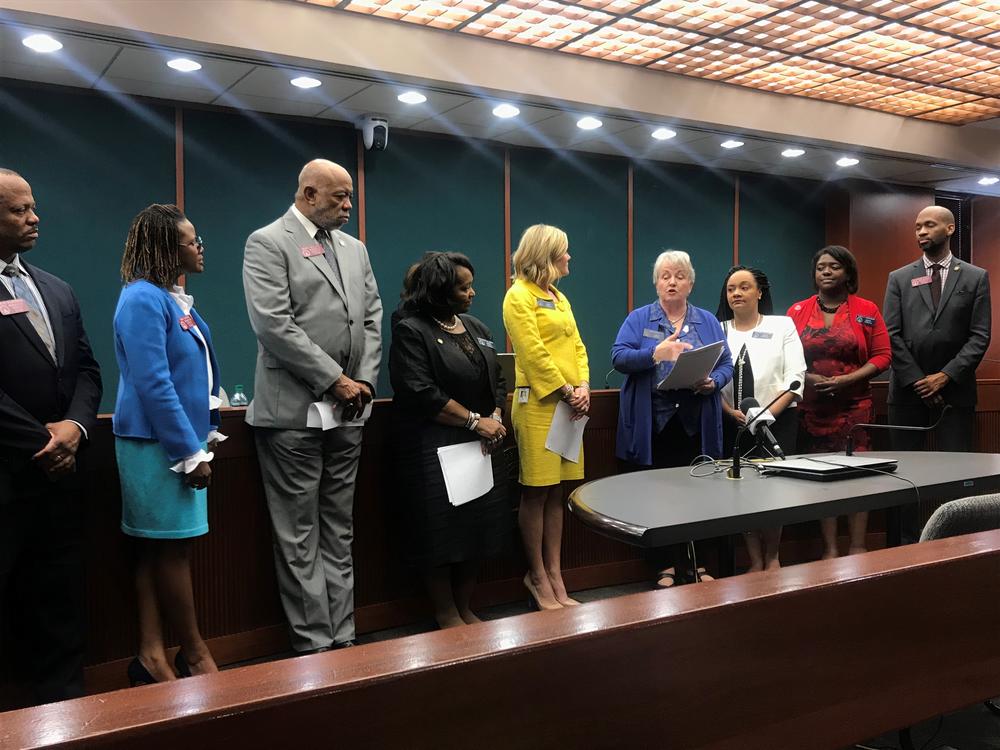Section Branding
Header Content
What's Your Previous Salary? Georgia Lawmakers Hope To Reduce The Impact Of This Question
Primary Content
For some people, answering how much you made at a previous job is just a routine part of applying for a new job. But some Georgia lawmakers want to change that.
“We know right now, that it is OK for any employer in the state of Georgia to ask someone what they made in their previous job,” said Rep. Park Cannon, a Democrat from Atlanta. “And to base either hiring them or their salary on that previous job.”
Cannon has filed legislation that would make it illegal for employers to rely on what a person used to make in determining how much to offer them. She said employers should price the job, not the person.
“They come to the table knowing that they can hire for one administrative assistant and they’ve got about $40,000 to do that,” she said. “Whether or not that person who comes to the interview has ever made $40,000 should not matter to them because they’ve already priced that position.”
Closing The Wage Gap
The bill is a part of a larger effort to close the wage gap. According to the National Partnership for Women and Families, women in Georgia make about 81 cents for every dollar a man makes.
For black women, that falls to 63 cents.
Other states, like Massachusetts, already have laws like this on their books.
“From now on employers cannot ask about your salary history before making a job offer,” Massachusetts Attorney General Maura Healey said in a video about the state’s equal pay law.
“That’s a big deal. For most women the gender pay gap starts early in their career and too often employers make salary decisions based on what you were paid before.”
Marlene Kim, an economics professor at the University of Massachusetts-Boston, said employers are asking the wrong question when it comes to salary requirements.
“The question really is why not ask someone what kind of salary are you looking for instead of basing it on salary history?”
Legal Issues
It’s hard to determine if this is a practice that happens, employers offering a lower salary because of previous earnings, since candidates usually aren’t in the room when the salary is being decided.
Tamara Stevens, who owns a contracting company, said knowing a person’s salary history could very well lead to that happening.
“Let’s say I’ve got a position starting, at $75,000 a year,” Stevens said giving a hypothetical situation. “If they come in there and they put on their salary history they made $40,000, human nature I’m going to be like oh, I may be able to lower that a little bit.”
Stevens said that’s why her company doesn’t ask about salary history.
But HB5 wouldn’t stop employers from asking. A similar bill in Philadelphia was challenged in court because telling someone they can’t ask is a free speech issue.
The Georgia bill focuses heavily on the word “rely.” An employer can ask, they just can’t rely on the answer to set a salary. And if they did you could fight back.
Charles Bridgers, an attorney who handles cases involving the Fair Labor Standards act and wage litigation, said just feeling like the employer relied on that information isn’t enough.
“It would be very difficult to prove whether or not the salary they offered you was based on reliance of what you’d been asked or not been asked,” he said. And in order to prove it?
“You would have to either have direct evidence of an employer telling you, well I’m offering you a salary because you told me your salary was this before,” he said. “Other than that, you’d have to prove it through some type of circumstantial or burden shifting lawsuit.”
Negotiating Power
The bill has also drawn criticism for taking away candidates’ negotiating power.
But Cannon said it should give them more.
“We want people negotiating for a fair wage in Georgia,” she said. “What this bill does though, is it requests that those employers do not start the conversation, they just listen if you decide to share.”
Meanwhile the city of Atlanta, has taken it a step further.
Officials recently announced it would be banning the question of previous salary for city jobs.
“The city of Atlanta has taken a critical step toward the elimination of pay discrimination by removing salary history questions on employment applications,” Mayor Keisha Lance Bottoms said in a press release.
“Too often, salary history can trap employees in an unfair earnings cycle based on history rather than their skill set. Now, employees can be compensated based on their qualifications, experience and merit.”

